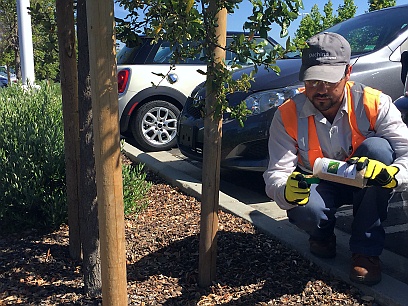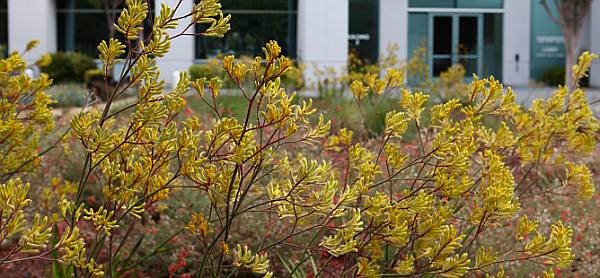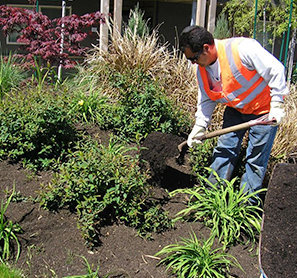Have you seen white fuzzy accumulations on the branches, trunk or leaves of your plants and trees? Spring is time for wooly aphids, and you might be under invasion. A minor wooly aphid infestation usually isn’t serious, as populations are typically small. However, proactive organic pest control may be a good idea, as wooly aphids may impact your landscape’s appearance, curling and distorting foliage and leaving sticky honeydew behind.
What Do Wooly Aphids Look Like?
California is home to several species of sap-sucking wooly aphids. They are small insects, about ¼ inch long, with a green, grayish brown, or blue body covered in a white, waxy material. Our plant health care experts generally find wooly aphids in groups on the underside of leaves, as well as on twigs, branches, bark, and occasionally roots. They gobble up the sugar-rich sap of plants, secreting large volumes of honeydew that coats surrounding vegetation and objects. Over time, the secretions can lead to the growth of sooty mildew.
Signs of Wooly Aphid Infestation
- Twisted, curled, distorted foliage
- Yellowing leaves
- Branch dieback
- Limb cankers
- Root galls
- Sticky honeydew
- Sooty mold
Wooly Aphid Control Tips
Our plant health care experts advise local treatment of wooly aphids only when necessary to safeguard beneficial insects and the natural predators of aphids. Pruning out and destroying infested branches usually works quite well. Incorporating beneficial insect predators is another successful way to control aphids. If additional treatment is needed, we may use neem oil, white oil, and insecticidal soap sprays.
Wooly Aphid Prevention
Healthy plants repel pests, so our landscape maintenance team recommends preventing wooly aphid infestations before they start with proactive care. We recommend testing soil to ensure the proper mix of nutrients, as excess nitrogen attracts aphids. Organic fertilizers that slowly release nutrients, like compost, manure, fish emulsion, and other organic amendments that nourish the soil without spiking nitrogen, are ideal.
Spring is time for wooly aphids. Keep these pests at bay with plant health care services in the Bay Area, Palo Alto, Burlingame, San Francisco, San Jose, Pleasanton, Hayward, Fremont, Livermore, and Walnut Creek from Gachina Landscape Management. Call us at 650-853-0400 to make an appointment or fill out our online contact form today.








